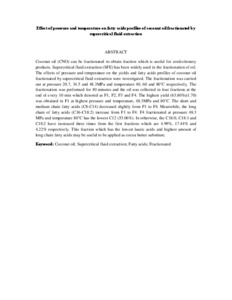Citation
Abdul Halim, Halimatun Sa'adiah and Hussain, Norhayati
(2016)
Effect of pressure and temperature on fatty acids profiles of coconut oil fractionated by supercritical fluid extraction.
In: Monash Science Symposium (MSS) 2016, 21-23 Nov. 2016, Monash University Malaysia. .
Abstract
Coconut oil (CNO) can be fractionated to obtain fraction which is useful for confectionery products. Supercritical fluid extraction (SFE) has been widely used in the fractionation of oil. The effects of pressure and temperature on the yields and fatty acids profiles of coconut oil fractionated by supercritical fluid extraction were investigated. The fractionation was carried out at pressure 20.7, 34.5 and 48.3MPa and temperature 40, 60 and 80°C respectively. The fractionation was performed for 40 minutes and the oil was collected in four fractions at the end of every 10 min which denoted as F1, F2, F3 and F4. The highest yield (63.80%±1.70) was obtained in F1 at highest pressure and temperature, 48.3MPa and 80°C. The short and medium chain fatty acids (C8-C14) decreased slightly from F1 to F4. Meanwhile, the long chain of fatty acids (C16-C18:2) increase from F1 to F4. F4 fractionated at pressure 48.3 MPa and temperature 80°C has the lowest C12 (53.06%). In otherwise, the C18:0, C18:1 and C18:2 have increased three times from the first fractions which are 4.99%, 17.44% and 4.22% respectively. This fraction which has the lowest lauric acids and highest amount of long chain fatty acids may be useful to be applied as cocoa butter substitute.
Download File
![[img]](http://psasir.upm.edu.my/66187/1.hassmallThumbnailVersion/Effect%20of%20pressure%20and%20temperature%20on%20fatty%20acids%20profiles%20of%20coconut%20oil%20fractionated%20by%20supercritical%20fluid%20extraction.pdf)  Preview |
|
Text (Abstract)
Effect of pressure and temperature on fatty acids profiles of coconut oil fractionated by supercritical fluid extraction.pdf
Download (35kB)
| Preview
|
|
Additional Metadata
Actions (login required)
 |
View Item |

